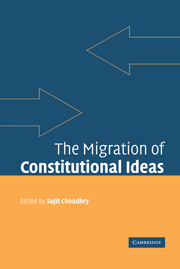Book contents
- Frontmatter
- Contents
- List of contributors
- Acknowledgements
- 1 Migration as a new metaphor in comparative constitutional law
- PART I The methodology of comparativism
- PART II Convergence toward a liberal democratic model?
- PART III Comparative constitutional law, international law and transnational governance
- 9 Inimical to constitutional values: complex migrations of constitutional rights
- 10 Democratic constitutionalism encounters international law: terms of engagement
- 11 Constitution or model treaty? Struggling over the interpretive authority of NAFTA
- 12 The migration of constitutional ideas and the migration of the constitutional idea: the case of the EU
- PART IV Comparative constitutional law in action – constitutionalism post 9/11
- Index
12 - The migration of constitutional ideas and the migration of the constitutional idea: the case of the EU
Published online by Cambridge University Press: 25 July 2009
- Frontmatter
- Contents
- List of contributors
- Acknowledgements
- 1 Migration as a new metaphor in comparative constitutional law
- PART I The methodology of comparativism
- PART II Convergence toward a liberal democratic model?
- PART III Comparative constitutional law, international law and transnational governance
- 9 Inimical to constitutional values: complex migrations of constitutional rights
- 10 Democratic constitutionalism encounters international law: terms of engagement
- 11 Constitution or model treaty? Struggling over the interpretive authority of NAFTA
- 12 The migration of constitutional ideas and the migration of the constitutional idea: the case of the EU
- PART IV Comparative constitutional law in action – constitutionalism post 9/11
- Index
Summary
Introduction: beyond inter-state migration
How, if at all, do two increasingly topical debates – one concerned with the ‘migration’ of constitutional ideas and the other with the constitutionalization of supranational entities such as the European Union (EU) – connect? This is no simple question. Even if restricted to the traditional domain of inter-state movement, the debate on the migration of constitutional ideas is complex and contentious both empirically and normatively. It is empirically complex because the sources of the migrating constitutional ideas tend to be diffuse, hidden, or rhetorically overstated, and their reception mediated by and their meaning more or less subtly adjusted within the recipient legal system, both at the initial point of political and judicial interpellation and in their subsequent legal-cultural re-embedding. It is normatively contentious because there are such strong and well-rehearsed prima facie arguments both for and against migration – most of which, moreover, seem resistant to conclusive empirical proof or refutation – and, therefore, much disagreement about the circumstances and conditions, if at all, under which migration is acceptable or desirable.
The migration of constitutional ideas may be a ‘good thing’ where it counters parochial tendencies within national constitutional law, providing alternative models of constitutional virtue against which the domestic model can be evaluated, or, even if the most basic norms and ends of the recipient order are not challenged, supplying a broader range of constitutional techniques in the search for the optimal means towards the realizations of these norms or ends.
- Type
- Chapter
- Information
- The Migration of Constitutional Ideas , pp. 316 - 344Publisher: Cambridge University PressPrint publication year: 2007
- 6
- Cited by



